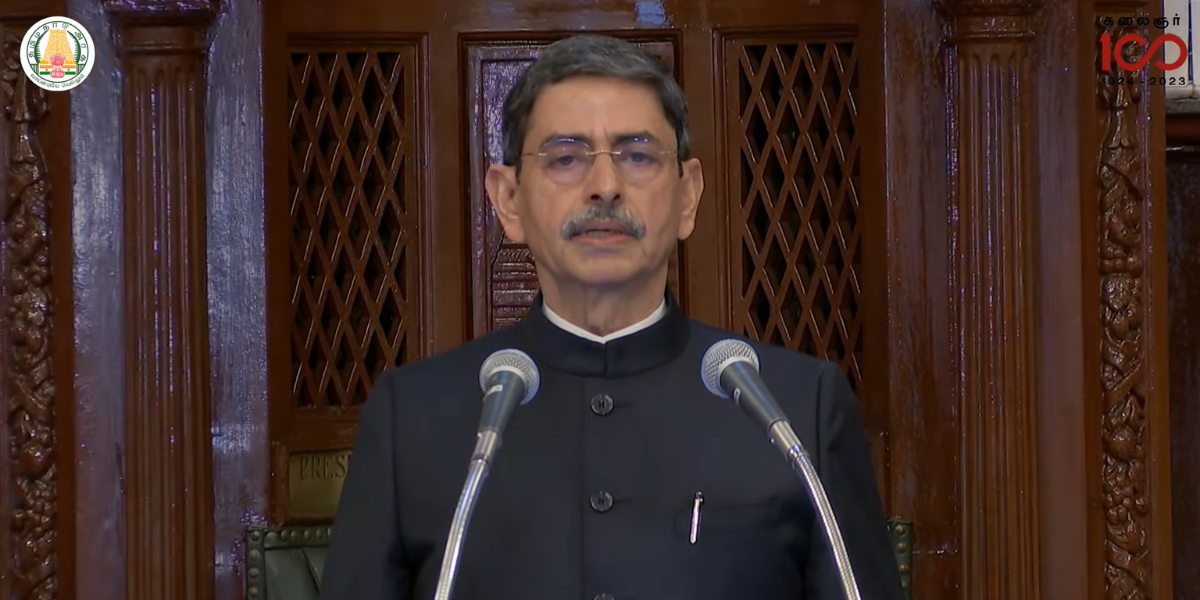This incident in TN echoes a similar situation in Kerala, where Governor Khan skipped the customary speech, reading only the last paragraph.

Governor RN Ravi speaking at the Tamil Nadu Legislative Assembly on 12 February. (Screengrab)
Further straining his relationship with MK Stalin-led DMK government in Tamil Nadu, Governor RN Ravi refused to read the policy note during his customary address to the Assembly.
The Tamil Nadu Legislative Assembly session commenced on Monday, 12 February, with Governor RN Ravi’s conspicuous departure from tradition. RN Ravi’s refusal to read the policy note comes barely days after his Kerala counterpart Governor Arif Mohammed Khan too refused to deliver the full speech in the Kerala Assembly and only read out the last paragraph.
Governor Ravi, known for his strained relationship with the DMK-led state government, opted not to read the mandated speech prepared by the ruling party, which typically highlights their achievements.
The speech, meant to introduce the policy note prepared by the government, is supposed to be part of the Governor’s special address mandated under Article 176 of the Indian Constitution. The Constitution also requires the House to allot time to discuss the Governor’s address.
Governor Ravi opened his address with a brief acknowledgement, expressing his honour in delivering the inaugural address for the year 2024 but wrapped it up in under three minutes refusing to deliver his speech on the policy note.
The House was convened on 12 February by the government for the customary Governor’s Address to the Assembly.
RN Ravi’s counterpart in Karnataka — Governor Thaawar Chand Gehlot — addressed the joint session of the State legislature and delivered a speech hailing the guarantees by the Siddaramaiah government.
He quoted the words of poet Thiruvalluvar, “Piniyinmai selvam vilaivinpam emam aniyenpa naattiv vaindhu,” (A country’s jewels are these five: unfailing health, fertility, joy, a sure defence, and wealth), which he said, “encapsulate the vision of this government for the state”.
From here, he veered away from the expected content. “Friends, my repeated request and advice to show due respect to the national anthem and play it at the beginning and end of the address has been ignored,” the Governor said.
“This address has numerous passages with which I convincingly disagree on factual and moral grounds. I lending my voice to them would constitute a constitutional travesty. Hence, with respect to the House, I conclude my address. I wish this House a healthy and productive discussion for the good of the people,” Governor Ravi concluded, amid a short-lived uproar from the House.
Ravi’s address to the House was just over 3 minutes.
#TamilNadu Governor #RNRavi skips speech in Assembly, abandons @mkstalin government’s policy note#GovernorRNRavi opened his address with a brief acknowledgement, expressing his honour in delivering the inaugural address for the year 2024 but wrapped it up in under three minutes… pic.twitter.com/YhUEshISkB
— South First (@TheSouthfirst) February 12, 2024
The discord between Governor Ravi and the state government has been escalating, with Ravi impeding legislative progress, deviating from approved texts, and ordering the dismissal of jailed Minister Senthil Balaji before retracting the decision.
The recent bone of contention involved controversial notifications by the Governor to unilaterally constitute search committees for Vice-Chancellor candidates, a move “withdrawn” after the state government approached the Madras High Court and Supreme Court.
This incident in Tamil Nadu echoes a similar situation in Kerala, where Governor Arif Mohammed Khan also skipped most of the mandated speech, opting to read only the last paragraph.
Governor Khan’s move on 25 January was met with swift controversy, and his brief address focused on the essence of cooperative federalism, unity, and democratic values.
He began the address by greeting everyone in the House and then said, “I will now read the last para.”
Reading out the last of the 136 paragraphs of the 62-page policy address, the Governor said, “Let us remember that our greatest legacy lies not in buildings or monuments, but in the respect and regard we show to the priceless legacy of the Constitution of India and the timeless values of democracy, secularism, federalism and social justice.”
He further said that the essence of cooperative federalism is what has kept India united and strong all these years and it was everyone’s bounden duty to ensure that this essence is not diluted.
“Together as part of this varied and beautiful nation we will weave the tapestry of inclusive growth and responsible resilience, overcoming all the challenges that are thrown our way,” he said, concluding his address, and sat down in the seat marked for him on the dais.
Thereafter, the national anthem was played and, after it ended, Khan walked out of the Assembly, the entire exercise taking just under five minutes.
Governor Khan and the Left government in Kerala have been embroiled in disputes over various issues, including university functioning and his refusal to sign certain Bills passed by the elected Assembly, not to mention the many black flag protests against the Governor by the ruling party’s student organisation SFI.
Governors Ravi and Khan have emerged as “problem child” governors, refusing to deliver their mandated speech to the House. Their unconventional approaches have stirred controversy and heightened tensions, shedding light on the complex dynamics between appointed Governors and elected state governments.

Jul 26, 2024

Jul 26, 2024

Jul 25, 2024

Jul 21, 2024

Jul 21, 2024

Jul 21, 2024